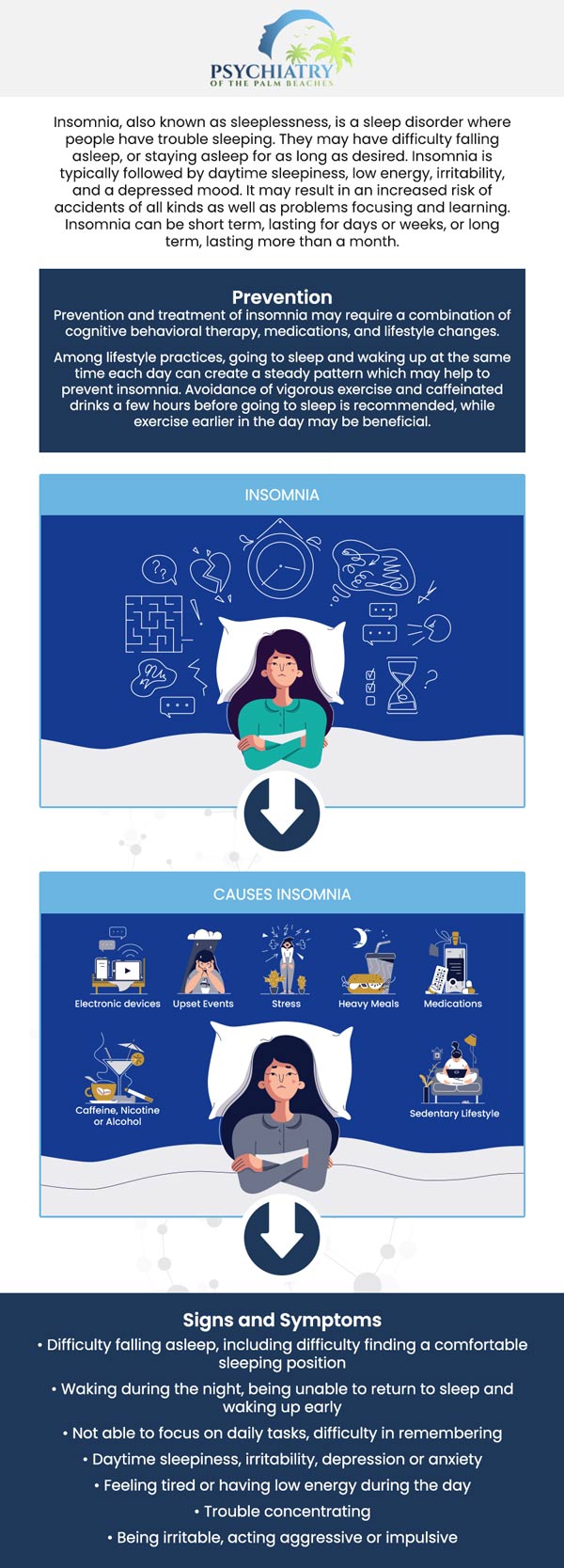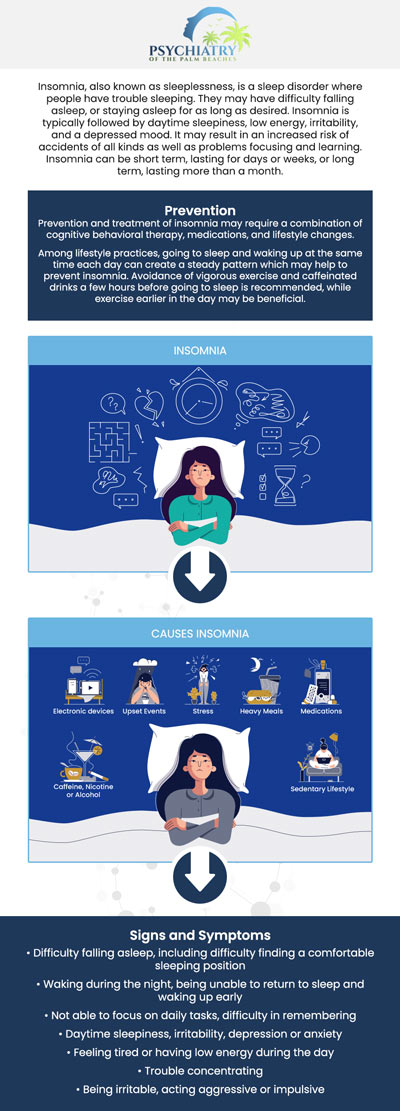Understanding the Long-Term Effects of Insomnia on Mental Health
At Psychiatry of the Palm Beaches, we explore the long-term impact of insomnia on mental health. Dr. David Husted and our team provide tailored treatments to improve sleep and overall well-being. Our goal is to help patients restore balance and enhance quality of life. For more information, contact us or book an appointment online. Visit Psychiatry of the Palm Beaches serving Jacksonville, Boynton Beach, Palm Beach Gardens, Stuart, Royal Palm Beach, Port St. Lucie, Melbourne, Fort Lauderdale, and Jupiter, FL.


Table of Contents:
How does insomnia affect mental health over time?
Can insomnia contribute to the development of anxiety or depression?
How does sleep deprivation from insomnia impact cognitive function?
Can chronic insomnia lead to mood disorders?
Insomnia involves issues with sleep that extend beyond the occasional restless night. It often develops into a pattern of ongoing difficulty with falling asleep, staying asleep, or waking too early without being able to return to rest. Over time, the lack of consistent, restorative sleep takes a toll on both physical health and emotional stability. Fatigue sets in quickly, but so does a sense of emotional detachment or irritability that becomes harder to shake the longer the pattern goes on. The specialists at Psychiatry of the Palm Beaches take a comprehensive approach to insomnia, treating it as both a symptom and a condition, offering treatment that addresses both sleep quality and the mental health challenges that often accompany its presentation.
The longer insomnia continues, the more likely it is to negatively impact a person’s mental health, their ability to manage stress, regulate mood, or maintain a consistent sense of well-being. Rest serves as a foundation for mental health, and when that foundation becomes unreliable, even minor challenges can begin to feel overwhelming. Irritability, emotional sensitivity, and a loss of motivation tend to show up early, often before the person fully realizes how sleep loss is influencing their mental state. Ongoing sleep disturbances can also disrupt the brain’s ability to process emotional experiences. Without adequate rest, it becomes harder to move through emotional highs and lows with any sense of stability. This may lead to a persistent feeling of being on edge or emotionally raw, especially in social situations or while trying to keep up with daily responsibilities. What begins as frustration with disrupted nights can slowly transform into more persistent feelings of discouragement or detachment.
Specialists at Psychiatry of the Palm Beaches work with patients experiencing these patterns to reestablish healthy sleep cycles and support their broader emotional wellbeing, which insomnia can impact. By treating both the sleep issue and the emotional fallout, patients often find their mental resilience returning as sleep quality begins to improve.
Insomnia can lead to the onset or worsening of more complex emotional challenges, including both anxiety and depression. The persistent struggle to rest can create a worry that builds throughout the day, leading individuals to dread bedtime before it even arrives. That anxiety around sleep tends to spill over into other areas of life, especially as sleep deprivation heightens emotional reactivity and reduces the ability to manage daily stressors calmly. As the body continues to miss out on the restorative functions of sleep, emotional balance tends to suffer. Thoughts become more repetitive, mood dips become more frequent, and the ability to find joy or motivation in routine activities may start to fade. Depression often takes root in this context, not only because the mind is exhausted but because the individual begins to feel disconnected from others and themselves. Even when they try to push through the day, that underlying emotional flatness remains difficult to ignore. In treatment, patients are supported through the emotional impact of prolonged insomnia, with care designed to ease both the physical and psychological strain before it develops into a more complex mood disorder.
Cognitive decline related to insomnia tends to show up in subtle ways at first. Individuals may notice that their memory seems unreliable, their ability to concentrate has slipped, or that conversations take more effort to follow. These lapses in focus can feel especially frustrating when they interfere with work, parenting, or basic problem-solving throughout the day. The brain relies heavily on sleep to reset and process new information, so it doesn’t take long for cognitive strain to set in when that process is interrupted.
Over time, decision-making becomes slower and more reactive. Tasks that once felt easy may seem more complicated, often leading to feelings of self-doubt or embarrassment. Even when someone is aware that poor sleep is to blame, they may still feel frustrated or disappointed in themselves, which only adds to the emotional exhaustion they are already facing.
At Psychiatry of the Palm Beaches, providers work with patients experiencing cognitive strain from insomnia by helping them rebuild healthier sleep patterns while also addressing the mental fatigue directly. Care often includes practical support for attention and memory, with an understanding that recovery takes more than just a good night’s sleep. As mental sharpness begins to return, patients often report a renewed sense of confidence in their day-to-day thinking and performance.
When insomnia becomes chronic, the emotional toll often deepens into more sustained patterns of distress. Individuals may initially feel frustrated or impatient with their disrupted sleep, but over time, those feelings can harden into more constant irritability, emotional withdrawal, or sadness that lingers beyond the night. The brain simply doesn’t function at its best when deprived of rest for long periods, and the emotional system tends to reflect that strain.
As the pattern continues, many individuals begin to feel like they are living in a kind of fog, where joy feels distant and motivation is hard to access. This emotional flatness, especially when combined with fatigue, often meets the diagnostic criteria for a mood disorder. What began as difficulty sleeping becomes more complicated, and without intervention, it often becomes harder to untangle which came first between the depression and the insomnia because they reinforce each other so consistently.
The providers at Psychiatry of the Palm Beaches design treatment to interrupt this cycle. By working to stabilize sleep while also directly treating mood symptoms, individuals are given space to recover without having to wait for one issue to resolve before addressing the other. This dual focus can often lead to longer-lasting relief than treating either concern on its own.
Long-Term Insomnia’s Mental Effects Explained by Our Team
Insomnia becomes more than a nightly frustration when it persists—it reshapes mood, cognition, and overall mental health. Our team explains that ongoing sleep deficits disrupt mood-regulating pathways, making it harder to cope with stress. This can lead to frustration, sadness, and mental fatigue. Our team offers strategic interventions to help restore balance and protect long-term emotional well-being.
Insomnia treatment is available at Psychiatry of the Palm Beaches. For more information, contact us or book an appointment online. We have convenient locations to serve you. We serve patients from Boynton Beach FL, Delray Beach FL, Palm Beach Gardens FL, Jupiter FL, Stuart FL, Palm City FL, Royal Palm Beach FL, Wellington FL, Citrus Ridge FL, Jacksonville FL, Riverside FL, Port St. Lucie FL, Beau Rivage West FL, Melbourne FL, Palm Bay FL, Fort Lauderdale FL, Hollywood FL, Jupiter FL, North Palm Beach FL, and surrounding areas.
Check Out Our 5 Star Reviews



Additional Services You May Need
▸ Mental Wellness
▸ Relationship Coaching
▸ Depression and Mood Disorders
▸ Women’s Health
▸ Panic Disorder
▸ Medications Management
▸ Men’s Health
▸ Individual Psychotherapy
▸ Bipolar
▸ ADHD
▸ Geriatric Mental Health
▸ Couple’s Counseling
▸ Obsessive Compulsive Disorder
▸ Social Phobia Treatment
▸ Eating Disorders
▸ Post Traumatic Stress Disorder
▸ Psychotic Disorders


